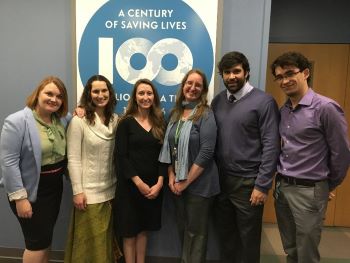Profile of a Veterinary Scientist: Meghan Davis, D.V.M., Ph.D., M.P.H.

Interactions between humans and companion animals have been shown to produce mental, social, and physiological benefits in children and adults. Therapy dogs, for example, can provide individually tailored support for patients. Many pet owners, however, likely are unaware of the ecological connections that they have forged with the animals in their households. Humans and companion animals possess a shared microbiota, meaning that the introduction of a pet likely will alter the household’s microbial community.
According to the Centers for Disease Control and Prevention, “One Health is an approach that recognizes that the health of people is closely connected to the health of animals and our shared environment.” It is this framework that forms the basis for Dr. Meghan Davis’ research. Dr. Davis, an associate professor in the Department of Environmental Health and Engineering at the Johns Hopkins Bloomberg School of Public Health (JHSPH), seeks to characterize the interface between bacteria and animal hosts by publishing data to inform policies aimed at minimizing microbe-mediated disease.
Dr. Davis, who oversees the One Health Laboratory at Johns Hopkins University, brings a unique perspective to this area of research. Initially trained as a veterinarian at the University of California, Davis School of Veterinary Medicine, she possesses experience in both clinical and laboratory settings. After entering a graduate program in Environmental Health at JHSPH in 2008, Dr. Davis became interested in the interplay between household factors—people, pets, and their environments—and disease transmission and noninfection outcomes (e.g., asthma). “I’m making suggestions from a public health lens, and I’m taking this back into my research,” Dr. Davis explained. “These two professional areas inform each other a great deal.”
The One Health approach uses a systems-thinking, engagement-based process involving community stakeholders and researchers from a broad array of disciplines. As a practicing veterinarian, Dr. Davis has worked in rural communities with members of lower-income populations. After observing anecdotal evidence of a relationship between environmental factors and health effects in her patients’ households, she was inspired to collect data to further explore this phenomenon.
Supported by a K01 Special Emphasis Research Career Award (SERCA) grant (K01OD019918) from ORIP, Dr. Davis is documenting the exchange of bacteria between children and animals in households located in an inner city area of Baltimore, Maryland. Specifically, her research is focused on exploring the relationship between bacterial exposure and exacerbation of allergic asthma, a condition that disproportionally affects children in urban areas.1 By detecting molecular “signatures” of pest microbes,2 as Dr. Davis explained, researchers may be able to develop therapeutic and practical approaches (e.g., air filters, more frequent laundering) to lessen the symptoms of asthma in affected children.

Dr. Davis indicated that her research aims to balance the negative and positive effects of human–animal interactions, providing data to assist affected pet owners. “We know that if you’re allergic to pets and you have one, you’re going to have symptoms. We’re trying to disentangle that, to keep the benefits, and address just the negative effects,” Dr. Davis clarified. “Animals are scientifically and clinically proven to provide health benefits, so we want to keep animals in the home whenever it is feasible.”
Another topic of interest to Dr. Davis’ group is the health effects of animal-assisted intervention programs in hospital settings. These programs provide physical and mental health benefits for patients, but physicians often are concerned about the risks of microbial transmission through the animals. Dr. Kathryn Dalton, a recent graduate of Dr. Davis’ laboratory who completed her veterinary training at the University of Pennsylvania School of Veterinary Medicine in 2013, explored this topic in her doctoral studies at JHSPH.3 Now, Dr. Davis, supported by an R01 grant (R01HD097692) from the Eunice Kennedy Shriver National Institute of Child Health and Human Development, is studying the use of chlorhexidine-based interventions in therapy dogs to counter the associated transmission risks for hospitalized children.
Dr. Davis emphasized that the goal of her work is to provide data to inform policy changes in affected settings, as many animal-assisted intervention programs develop their health policies in coordination with participating hospitals. Dr. Davis noted that policymaking is a complex process with numerous factors and perspectives that must be considered. For this reason, multidisciplinary collaboration and engagement represent a crucial component of the One Health approach.
Veterinary scientists, like Dr. Davis, provide a crucial voice in public health studies. Their animal-based training and expertise provide these researchers with a unique outlook on the health of—and interactions among—animals, humans, and their environments. “It’s really important for veterinary scientists to be supported because our perspectives are different from our colleagues’,” Dr. Davis stated. “We need people trained in different kinds of work to support these larger efforts to address emerging public health challenges.”
References
1 Milligan KL, Matsui E, Sharma H. Asthma in urban children: Epidemiology, environmental risk factors, and the public health domain. Curr Allergy Asthma Rep. 2016;16(4):33. doi: 10.1007/s11882-016-0609-6.
2 Davis MF, Ludwig S, Brigham EP, et al. Effect of home exposure to Staphylococcus aureus on asthma in adolescents. J Allergy Clin Immunol. 2018;141(1):402–405. doi: 10.1016/j.jaci.2017.06.031.
3 Dalton KR, Waite KB, Ruble K, et al. Risks associated with animal-assisted intervention programs: A literature review. Complement Ther Clin Pract. 2020;39:101145. doi: 10.1016/j.ctcp.2020.101145.



